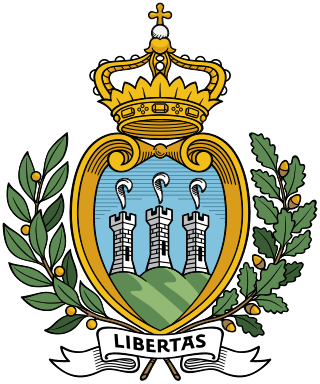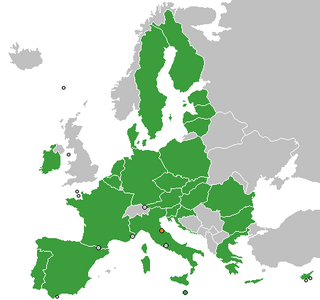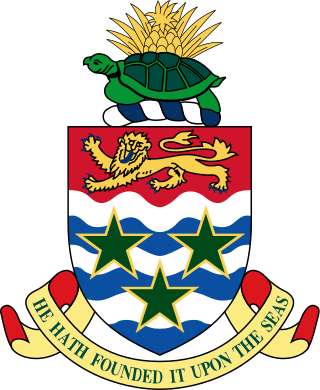
A referendum is a direct vote by the electorate on a proposal, law, or political issue. This is in contrast to an issue being voted on by a representative. This may result in the adoption of a new policy or specific law, or the referendum may be only advisory. In some countries, it is synonymous with and also known as plebiscite, votation,popular consultation, ballot question, ballot measure, or proposition.
A double majority is a voting system which requires a majority of votes according to two separate criteria. The mechanism is usually used to require strong support for any measure considered to be of great importance. Typically in legislative bodies, a double majority requirement exists in the form of a quorum being necessary for legislation to be passed.

A referendum, in the Italian legal system is a request directed to the whole electorate to express their view on a determined question. It is the main instrument of direct democracy in Italy.

San Marino elects on the national level a legislature. The Grand and General Council has 60 members, elected for a five-year term by semi-proportional representation with national majority bonus.

The 2009 Washington Referendum 71 (R-71) legalized domestic partnership in Washington state, the first statewide referendum in the United States that extended to LGBT people the rights and responsibility of domestic partnership. The bill had passed State Legislature, and it was signed into law by the Governor in May 2009, but opponents gathered enough signatures to put the measure before the voters, who returned ballots by mail over three weeks ending on November 3, 2009, approving the measure 53% to 47%. The new law went into effect 30 days later, on December 3, 2009.

Relations between the Republic of San Marino and the European Union (EU) began in February 1983. San Marino is completely surrounded by one EU member state, Italy.

A referendum on the citizenship law was held in San Marino on 12 September 1999. Voters were asked whether the new citizenship law passed on 16 June should come into force. Although a majority voted in favour, the quorum of 32% of registered voters (9,663) was not achieved and the referendum failed.

A referendum on the electoral law was held in San Marino on 3 July 2005. Voters were asked four questions on changes to the electoral law and electoral system. Although all four were approved by a majority of those voting, voter turnout was just 21.7%, meaning that the quorum of 32% of registered voters (10,143) was not achieved for any question. This resulted in all four questions failing, including two that proposed raising the quorum to 40%.

A referendum on the voting system was held in San Marino on 3 August 2003. The proposed change would have reduced the number of preferential votes from three to one. Although it was approved by 80.72% of voters, the number voting in favour (8,755) did not pass the required quorum of 32% of all registered voters (10,105).

Four referendums were held in San Marino on 16 March 2008. Voters were asked questions on the voting system, raising salaries in line with inflation, projects, and the abolition of temporary employment contracts. As voter turnout was just 35.36%, all four referendums failed to pass the 32% quorum of registered voters required.

A referendum on changing the electoral system was held in the Cayman Islands on 18 July 2012. Voters were asked whether they wish to change the electoral system from one using multi-member constituencies to one with single member constituencies. Although the proposal was approved by a majority of those voting, the quorum of half of registered voters voting in favour was not met.
Abortion in San Marino is legal in the first 12 weeks of gestation for any reason. It is also legal until fetal viability if the pregnancy poses a risk to the woman's life, if the fetus has an anomaly that poses a risk to the woman's health, or if the pregnancy is the result of rape of incest. In case of risk to the woman's life after fetal viability, the pregnancy may also be interrupted by attempting a live birth.
A fifteen-part constitutional referendum was held in Colombia on 25 October 2003. Whilst all fifteen proposals were approved by voters, only one question had a sufficient numbers of votes to pass the 25% quorum requirement.

Two referendums were held in San Marino on 20 October 2013. Voters were asked whether they approved of measures to tie salary increase to inflation and whether the country should submit an application to join the European Union. Although both proposals had a majority vote in favour, neither reached the quorum of 32% of registered voters in favour, resulting in both proposals being rejected.
A referendum is a direct vote in which an entire electorate is asked to either accept or reject a particular proposal. This article summarises referendum laws and practice in various countries.

Two referendums took place in San Marino on 25 May 2014. Voters were asked whether they approved of repealing laws on pensions reform and on medical practice, both of which were passed on 29 October 2013. Voters approved both proposals.

Four referendums were held in San Marino on 15 May 2016. Three of the four proposals were approved, with the repeal of law 137 rejected.

Two referendums were held in San Marino on 2 June 2019. One was a popular initiative on amending the electoral system to require a second round to be held thirty days after a general elections between the top two parties only if neither are able to form a coalition government. The other was on a constitutional amendment proposed by the captain regent that would add sexual orientation to the list of discriminations prohibited by law. This followed a vote by the Grand and General Council on the amendment failing to meet the two-thirds quorum.

A referendum on the legality of abortion was held in San Marino on 26 September 2021. The result was an overwhelming vote in favour of legalisation.







